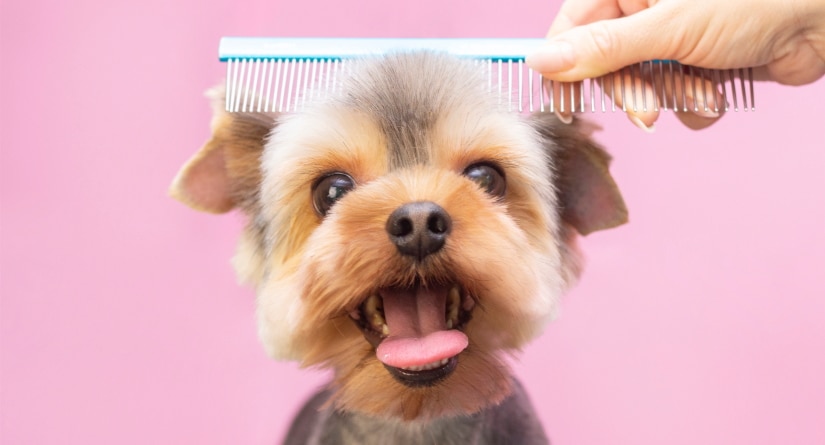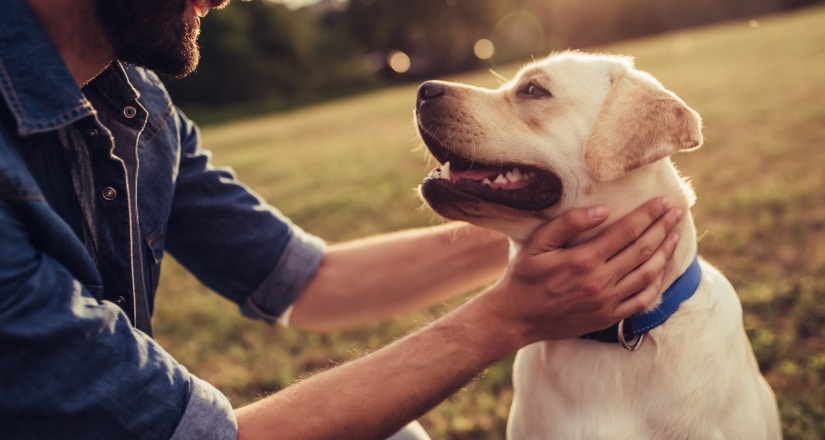While causes of acute-onset skin issues like insect bites are apparent and can be treated directly, most other forms of skin disease may be caused by deeper issues that may be hard to identify. If your pup has chronic or recurring skin conditions not related to influences outside the body, this may point to a severe or even life-threatening health issue.
That said, always consult with your veterinarian when assessing a skin problem to ensure that your pup gets the appropriate treatment. Natural remedies may be useful temporarily at suppressing pain and itchiness, but they will not address the root causes of your dog’s skin issues.

Parasites are organisms that can survive by living off your dog. External parasites that tend to infect dogs include fleas and ticks. If you’ve seen fleas on your dog, chances are that there are more in your home. Fleas can irritate your dog, spread disease, transmit other parasites, and cause your dog plenty of aggravation and pain.
In this blog, we’ll discuss the ten natural remedies to help soothe your dog and heal his bites. Keeping your furry best friend free of parasites is an essential part of good health care.
Bug bites on dogs can irritate your dog because one tiny flea bite could cause your dog’s skin to itch all over his body. The more your dog scratches, the worse it gets. Then your dog starts to lick and chew his skin to relieve the itch, which often results in an infection that requires costly visits to your vet.
Some dogs are so sensitive to flea saliva-the substance that causes the irritation. This is called flea allergy dermatitis. To rid your pup of fleas, consult with your veterinarian. There are numerous safe flea control products available today to prevent your dog from suffering from flea bites.
Bug Bites on Dogs: 10 Natural Remedies to Soothe and Heal Your Dog’s Skin
Mosquitoes and fleas love to bite your dog; however, their saliva can make your dog’s skin swell and result in lesions that ooze and become crusty.
You can choose from these seven natural herbal remedies to help soothe and heal your dog’s skin at home.

- Aloe Vera – Aloe Vera is one of the best plants to use as a remedy for flea and mosquito bites. Use aloe vera gel for your dog’s skin irritations and skin infections. When you use fresh aloe, cut off the leaf and remove the yellow part of the gel near the leaf. This yellow part, aloe latex, contains aloin, a chemical that may irritate your dog’s skin if she’s allergic to latex. Aloe vera can be used as a disinfectant and helps relieve bug bites on dogs. You can apply aloe vera gel three times daily.
- Citronella – Citronella oil comes from the leaves of Cymbopogon family plants. Use citronella oil in a spray along with your choice of cedarwood, eucalyptus, lavender, lemongrass, rosemary, sage, and thyme essential oils to help repel fleas, mosquitoes, and parasites. Make a mixture with 1-quart water, 1 cup organic apple cider vinegar, and 1-2 drops of these essential oils. Spray your dog before you take her outdoors for walks and play to help keep bugs away.
- Comfrey – Comfrey, an herbal plant, grows in North America and Europe. You can apply a poultice or compress as a remedy to help heal your dog’s skin conditions that result from bug bites on dogs. Use a clean sock or muslin bag to steep dried comfrey leaves in boiled water for 30 minutes. Squeeze out the sock or bag, let it cool and apply the poultice or compress on your dog’s affected area twice daily. Comfrey helps with your dog’s bites, rashes, or skin irritations.
- Licorice Root Tea – You can also use licorice root tea topically to help heal flea bites. Dip a cotton ball into a cool cup of tea and squeeze out most of the liquid. Gently press the wet cotton ball on bug bites to heal your dog’s skin.
- Mullein – Mullein, a wooly leafed biennial plant, grows throughout the United States. You can use mullein flowers and leaves in a tincture, compress or poultice for wounds and bug bites on dogs.
- Nettle – Found in Asia, Europe, northern Africa, and western North America, nettle is a herbaceous perennial flowering plant. Some nettle varieties may have hollow stinging hairs called trichomes on their leaves that act like hypodermic needles injecting histamine into animals and people who get too close. Nettle tea is perfect to use for your dog’s skin and coat. You can also use a nettle compress or poultice for flea bites. Nettle is an antihistamine and may help alleviate your dog’s allergic symptoms. Use a light spray of nettle tea if your dog has skin allergies.
- Plantain – Plantain, a perennial broadleaf wild weed, grows in your backyard from Spring to Autumn. High in vitamins A, C & K, plantain is anti-inflammatory, anti-bacterial, heal wounds faster, and stimulates your dog’s skin cells growth. Plantain can also be used on your dog’s skin to help heal bug bites on dogs.
- Oatmeal – Although this is not a herb, oatmeal is exceptionally beneficial for skin problems in dogs and people. It has anti-inflammatory properties and moisture-retaining properties that will help soothe and soften your pup’s skin and help with all cases of dermatitis. Lukewarm oatmeal baths will offer temporary relief from itchiness and pain.
- Calendula – This is another well-trusted herb for the skin. You can even use calendula tea that cooled and liberally apply the cool tea to your pup’s skin and coat. This will bring fast relief to itchy and inflamed skin. Calendula also accelerates the healing of open sores after a dog has itched excessively.
- Witch Hazel – As an extract, this is an excellent herbal astringent that can be bought from your local health store. Witch Hazel reduces inflamed membranes and works fast. You’ll need to apply a dab or two of witch hazel with a clean cotton ball to ease flea itch and inflammation.

Just remember, chronic skin issues can range from allergies to liver deficiency. Many things can cause excessive itching and inflamed skin. Skin problems in dogs have many causes, and you should always reach out to your veterinarian for the best advice as soon as possible.
All skin issues cause pain, itchiness and can make your pup uncomfortable. As usual, always look into your pup’s diet and remove fleas from your home by vacuuming often. You’ll also need to regularly wash your dog’s bedding and groom him with a flea comb to remove fleas. Consult with your vet as to the best flea preventative for your pet so that you can keep those pesky critters at bay.
